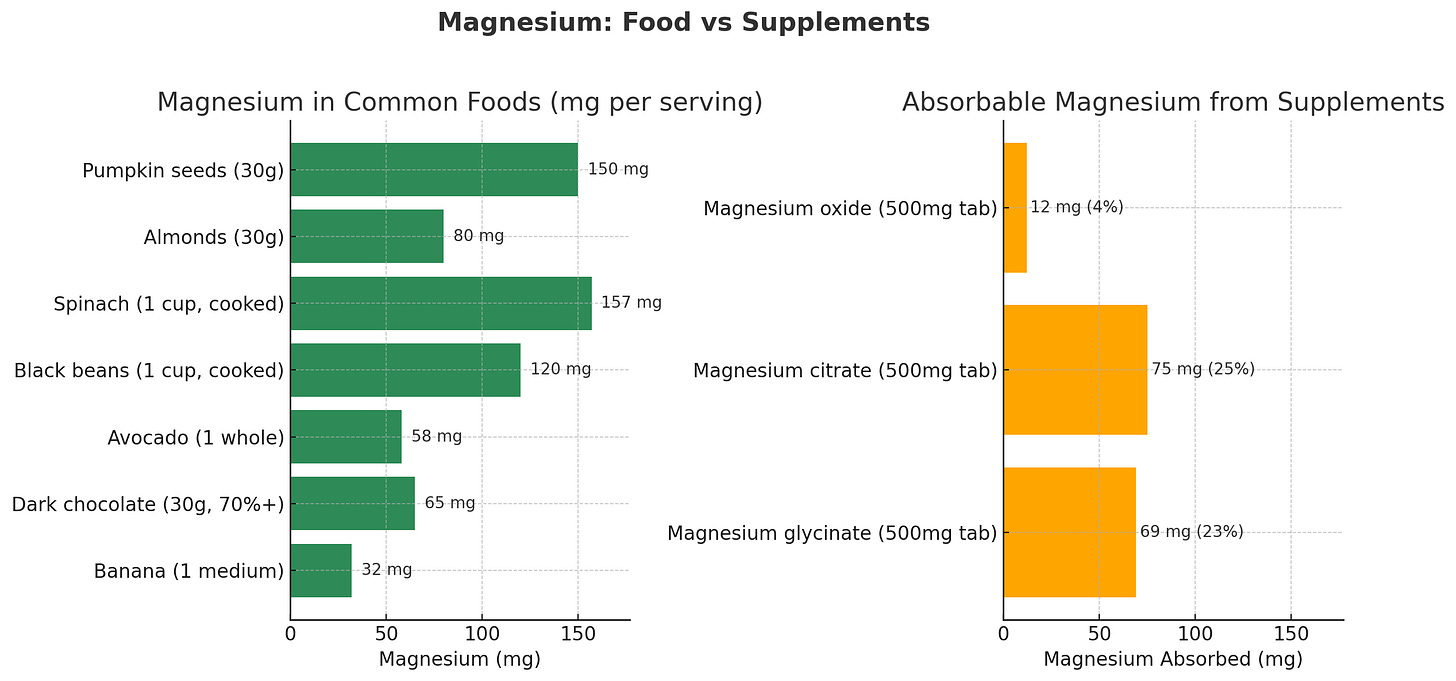Magnesium Supplements? Here’s What They’re Not Telling You...
Absorption can be as low as ONLY 4 percent!
Magnesium is everywhere right now. It is promoted for sleep, anxiety, bloating, PMS, and even skin health. But here’s what no one on Instagram or TikTok is telling you: you are most likely don’t need magnesium supplements, not all magnesium is created equal, and in some cases, the wrong form or dose can be harmful.
The form matters
Magnesium oxide? Poorly absorbed.
Magnesium citrate? Great if you need help with constipation, but not ideal before bed unless you want to be up in the bathroom.
Magnesium glycinate? Gentle and calming, perfect for relaxation, but it won’t do much for digestion.
Which is why magnesium from food is better
Your body is naturally designed to absorb and use magnesium from whole foods more efficiently than from most supplements. In food, magnesium comes packaged with other nutrients (like fibre, protein, antioxidants, and healthy fats) that work together to improve absorption and overall health.
Magnesium supplements, absorption can be as low as 4 percent. Some pass straight through your system without doing much at all, some can accumulate and can result in magnesium toxicity.
Foods rich in magnesium aren’t exotic or expensive. They’re everyday staples you probably already eat. The key is making them a regular part of your diet.
Here are some excellent natural sources:
Leafy greens (spinach, kale, silverbeet)
Nuts and seeds (almonds, cashews, pumpkin seeds, sunflower seeds)
Legumes (lentils, chickpeas, black beans)
Whole grains (brown rice, quinoa, oats)
Dark chocolate (70% cocoa or more)
Avocados
Bananas
These foods also provide a host of other benefits; something you don’t get from a pill, tablet or capsule.
Here’s how these foods stack up against supplements:
Food vs supplement: what’s the difference?
Absorption: Magnesium from food is naturally bound to compounds your body recognises and uses more effectively. Supplements often rely on chemical forms with variable absorption rates.
Balance: Food sources come with a balanced nutrient profile. Supplements can throw other minerals out of balance if taken in excess.
Safety: It is almost impossible to get too much magnesium from food, but it is very possible to overdo it with supplements.
Synergy: In whole foods, magnesium works alongside vitamins, minerals, and phytonutrients, amplifying its benefits.
The risks of overdoing it
High doses of supplemental magnesium can deplete calcium and potassium. And many magnesium supplements are paired with vitamin B6, which, in excessive amounts, has been linked to nerve toxicity in recent Australian cases.
My advice?
Use magnesium strategically, not blindly.
Prioritise whole food sources.
If you do supplement, match the form to your needs and avoid unnecessary megadoses.
When it comes to your health: science, not social media hype, should guide your choices.



Very informative and great advice.
I have tried Magnesium glysofate to help me sleep all night , seems to be helping but I will
Monitor how much I use , thanks ,, I didn’t know the difference in each type and had bought oxide originally ,